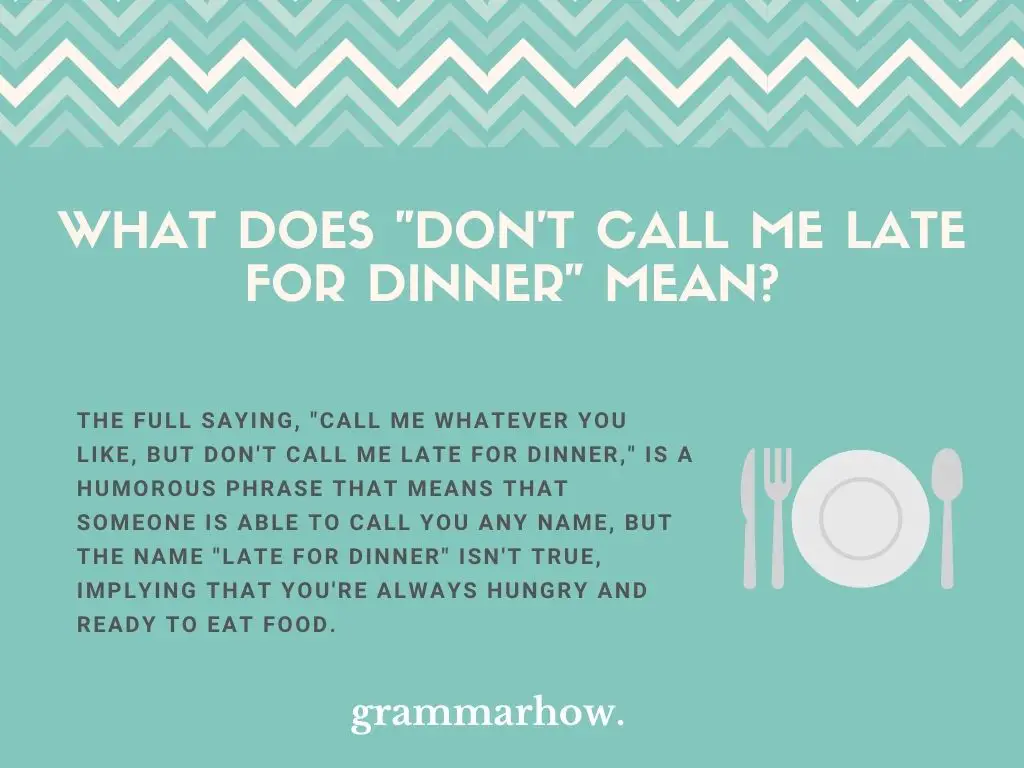The phrase “don’t call me late for dinner” is a humorous saying that we’ve developed over time to spare others’ embarrassment. It might help you to understand what it means and where it came from before you use it.
What Does “Don’t Call Me Late For Dinner” Mean?
The full saying, “call me whatever you like, but don’t call me late for dinner,” is a humorous phrase that means that someone is able to call you any name, but the name “late for dinner” isn’t true, implying that you’re always hungry and ready to eat food.

We can use the full phrase to settle someone’s nerves, especially if they’re struggling with addressing us for some reason. There are two main ways we can use the phrase.
One of the ways is when someone is unsure of how to address another person’s title. For example, if they’re an important dame or lady, the speaker might not know what title to address them as.
The second way is if two people have met before, but one of the people has forgotten the name of the other. To save the forgetful person the embarrassment, the other can utter this phrase and make a lighthearted joke out of it.
What Is The Origin Of “Don’t Call Me Late For Dinner”?
The origin story of this phrase is a fairly specific one. Not much is up for debate in this case, which makes it much easier to pinpoint where it came from.
The phrase originated in “Mercantile Drumming,” a short story published in 1833. Within the story, the saying, “call me what you please, but don’t call me too late to dinner,” was used as the first recorded instance.
Again, the intention of the original phrase is the same as it is today. In the short story, it was used as a way to break a bit of humor over a situation. Instead of worrying about embarrassing situations or anything like that, we can instead laugh at the ridiculous name.
The original saying intended “too late to dinner” to be the name, but we have since dropped “too” and replaced “to” with “for.” Other than that, the original meaning has stayed untouched.
Examples Of How To Use “Don’t Call Me Late For Dinner” In A Sentence
We mentioned earlier that there are two main ways to use the phrase. We figured we could break the examples down into two sections to help you understand exactly when and how those examples might work.
Addressing Important People
- Hello, Mrs. Stuart. Can I call you Mrs. Stuart?
- Honey, you can call me whatever you like, just don’t call me late for dinner!
- I’m really sorry, but I don’t know what name you go by!
- Name me whatever you like, but don’t name me late for dinner.
- What should I call you?
- Call me whatever you like, but don’t call me late for dinner!
- I’m so sorry, but what title do you prefer?
- Son, you can call me whatever you like. I wouldn’t recommend you call me later for dinner, though.
We can use this phrase in this way when someone doesn’t know how to address an important person. In this way, the important person is cracking a joke, which shows that they don’t take themselves too seriously and don’t mind whatever name you give to them.
Forgetting A Name
- I’m so sorry! Your name has completely slipped my mind!
- That’s alright! You can call me whatever, but don’t call me late for dinner.
- This is embarrassing, but what’s your name again?
- It’s Jack, but you can call me whatever you want. Just don’t call me late for dinner!
- Oh my god, I’m an idiot! I have totally forgotten your name.
- Don’t worry! You can call me anything at all, just don’t call me late for dinner.
- What’s your name again? It’s completely slipped my mind.
- It’s Nicola, but you can call me anything you want. I wouldn’t call me late for dinner, though.
Again, the phrase works in a humorous way to show that we don’t mind that somebody has forgotten our name. Instead, we’re trying to crack a joke to spare them the embarrassment that they might be going through.

Martin holds a Master’s degree in Finance and International Business. He has six years of experience in professional communication with clients, executives, and colleagues. Furthermore, he has teaching experience from Aarhus University. Martin has been featured as an expert in communication and teaching on Forbes and Shopify. Read more about Martin here.
